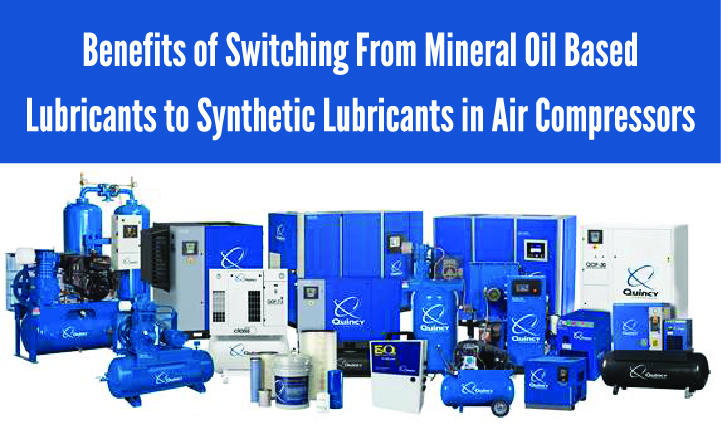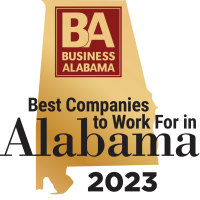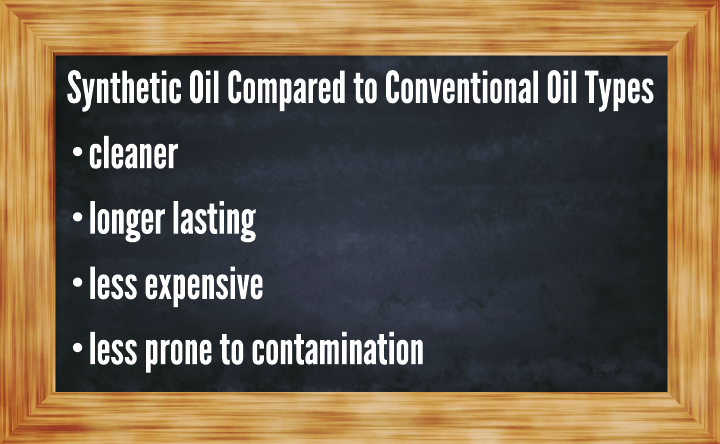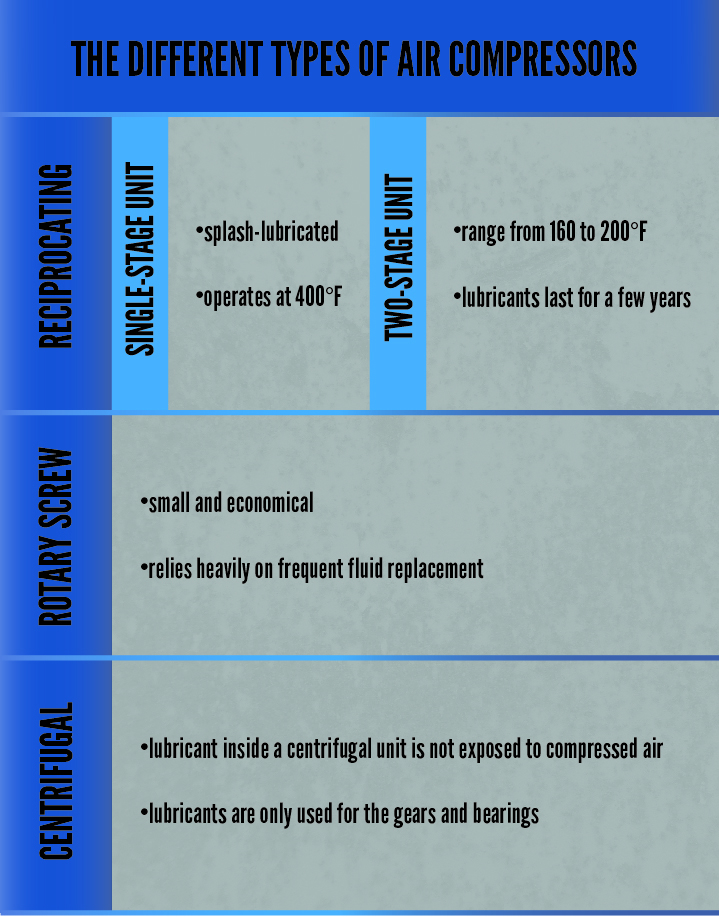
Oil is the lifeblood of most machinery, from vehicles and lawn mowers to sewing machines and air compressors. Inside of each machine exists a web of moving pieces, most of which consist of metal surfaces that — without proper lubrication — could end up damaged through repeated internal friction.
When friction gets out of hand, heat levels surge and parts fail, which results in breakdowns and hefty repair costs. Thankfully, all of these problems can be avoided with timely maintenance routines, adding clean, high-quality oil, which spares internal joints and surfaces of friction and keeps heat down to manageable levels in check.
Contact Us Learn More Find a Dealer Near You
For air compressors and various other forms of machinery, lubrication standards have improved in recent times with the adoption of synthetic oil, which is cleaner, longer lasting, many times less expensive and less prone to contamination than conventional oil types.
Conventional vs. Synthetic Lubricants
It’s now common knowledge that synthetic lubricants outperform conventional types of oil, but not many people actually know the reasons why. One of the more frequently asked questions when it comes to machines is “what is the difference between regular and synthetic lubricants for air compressors?” Fact is, there’s not just one difference — there are many.
Synthetic oils — which are derived from raw materials that have been synthesized — lack the impurities of regular oil because they’ve been cleansed, filtered and stripped down to their essential molecules. Therefore, air compressor oil specifications are better served by synthetics because the molecular makeup in synthetic lubricants is more attuned to the needs of such machinery.
Benefits of Synthetic Lubricants for Air Compressors
Rotary compressors have also improved thanks to changes in lubrication. In the technology’s earlier days, hydrocarbon lubricants had to be changed frequently in order to prevent varnishing on the insides of such machinery. The problem was ultimately resolved with the introduction of synthetic lubricants, which are biodegradable and to some degree water soluble. As such, when synthetics make their way to wastewater through condensation, there are fewer negative impacts on the treatment plants.
The rising popularity of rotary compressors has been mirrored by the overall trend toward conservation, which has been driven by the push for energy efficiency and the reduction of maintenance labor. The lifespan for a given supply of synthetic lubricants in a nonstop, round-the-clock operation is roughly 1.5 years. While the actual duration can depend on the demands of a given application, synthetics — even under the severest of conditions — last anywhere from six to 12 times as long as basic mineral oils.
In air compressors, fluid is put through a circular process that starts in the compression area and travels to an oil separator. Afterwards, the fluid is sent to a filter and then a cooler, before finally being returned to the compressor. The enemy in this process is varnish, which can materialize within the lubricant and clog up the coolers, separators or bearings. In any one of those situations, a compressor could ultimately stop working.
Fluids in compressors are typically unable to withstand the dual assault of heat and air. When contaminants in the lubricant collide with oxygen in an air compressor, oxidation happens fast, particularly in machines that use mineral oil. As heat intensifies, so too does oxidation — the outcome being heightened viscosity and an ultimately useless lubricant. Thankfully, synthetic lubricants have far less propensity for oxidation and thus eliminate this problem for many applications.
In short, the benefits of synthetic lubricants for air compressors are as follows:
- Reduced frequency of oil change-outs
- Reduced need for multiple filter assemblies
- Reduced frequency of repairs and parts replacements
- Reduced costs for maintenance labor
- Reduced consumption of power and energy
- Reduced likelihood of contamination and oxidation
- Increased savings on oil
- Increased mileage out of oil amounts
- Increased life expectancy of air compressors
Cost Efficiency and Better Performance
Due to the various problems associated with mineral oils, increasing numbers of operators are now opting to run air compressors on synthetic oil, which is more reliable, eco-friendly and cost efficient. With synthetic oil, maintenance is needed far less frequently due to the lack of inner-varnish, while change-out intervals are widened because of the added resilience. In the time it takes for an air compressor to burn through five 30-gallon lots of mineral oil, that same machine could operate on merely one 30-gallon measure of synthetic oil. In terms of operational costs, the reduced maintenance and better fluid mileage lead to an annual savings of roughly 40%.
If an air compressor operates at a maximum temperature of 180°F, the lifespan of a given measure of mineral oil will be halved for every 20°F hike above the limit. The overall performance of a compressor can ultimately be hindered by the breakdown of mineral oil inside because elements of degraded oil cause hardening and friction between various parts. By contrast, synthetic oil is less prone to oxidation, which gives it a greater lubricating power that resists heat and friction. Since synthetics don’t degrade like mineral oils, the former is unlikely to send malignant, damaging byproducts through an air compressor.
In high-grade synthetic fluids, the atomic makeup is such that temperatures up to 250°F can be withstood without any detrimental effects to the oil. This allows air compressors to handle temperature spikes without risk of internal friction or varnish buildup.
The Different Types of Air Compressors
Currently, three types of machines — reciprocating, rotary screw and centrifugal — are utilized in industries that rely on air compression. Each one of these machine types has its own needs in terms of lubrication, which can also vary depending on a given application:
Reciprocating
Compressors of the reciprocating variety fall into two categories: single and two-stage units. The former — which are usually splash-lubricated — generally lack high quality filtration, operate at roughly 400°F and generally endure high thermal stress. These factors, in addition to the small sump size, are the reasons why single-stage air compressors need quality anti-wear fluids.
Large reciprocating air compressors, for the most part, tend to be two-stage units. In these, the compression cylinder is isolated by the crosshead, which makes it possible for distinct lubricants to be applied in different places.
Due to the mild condition of the two-stage sump, hydrocarbon oils tend to be used in such machines. Heat levels in two-stage units generally range from 160 to 200°F with a relative lack of circulation, which results in slight amounts of oxidization. As a result of these conditions, lubricants often last for a few years in double-acting units before change-outs are necessary.
Rotary Screw
Air compressors of the rotary screw type are generally small and economical. Pressure levels and discharge temperatures are typically high in rotary screw compressors, though fluid capacities are limited due to the relatively small sumps. As such, the longevity of a rotary screw compressor relies heavily on frequent fluid replacement.
For the rotary screw compressor, fluids must comply with certain demands that don’t apply to reciprocating or centrifugal machines. In order to prevent fluid from flowing downstream along with the air in rotary screw units, the vapor pressure in that fluid should be kept to a minimum. Due to the frequent exposure of lubricants to the moisture and impurities of outside air, anti-corrosion measures are also vital with rotary screw compressors.
One of the most devastating things that can happen to a rotary screw air compressor is the inner formation of varnish, which can accumulate in the holes and passages and cause the lubrication to dry up around the bearings. This, in turn, can ultimately cause the machine to fail. Equally problematic is the presence of varnish on the rotors, which can lead to friction damage and send internal heat levels soaring. Another vulnerable area is the separator, which can fail if varnish layers form. Even short of failure, all of these issues can lead to increased energy consumption in rotary screw air compressors.
Centrifugal
Unlike reciprocating and rotary screw machines, the lubricant inside a centrifugal unit is not exposed to compressed air. Likewise, oxidation is less common or intense within a centrifugal air compressor because lubricants are only used for the gears and bearings. Therefore, different measures are needed to maintain stability with centrifugal units.
Of utmost importance are the bearing surfaces in centrifugal air compressors, which must remain free of varnish. With bearing clearances of around 0.001 inch, the slightest clearance drop can cause temperatures to spike, which can hurt the bearings. Fortunately, synthetic-oil conditions are easy to examine in centrifugal units, which is critical due to the sensitive viscosity requirements of such machinery.
When to Avoid Synthetic Oil
All across the air compressor industry, synthetic fluids have been endorsed by the vast majority of manufacturers. However, there are exceptions to the rule, such as when fluid failure occurs with a given machine due to impurities such as acid gas. The development of corrosive elements in synthetics is another matter that has given pause to manufacturers, though such cases are rare. When such factors come to bear on a given application, the recommended alternative to synthetics are hydrocarbon fluids, which have the perk of being inexpensive — but they do need to be changed more often, having a maximum life of roughly 1,000 hours.
Fluid Analysis and Change Intervals
Oil examinations are sometimes performed by operators of reciprocating, rotary screw and centrifugal air compressors. The purpose of such an analysis is to see whether the fluid in a given machine is still viable and to determine the frequency at which change-outs should occur. For rotary compressors in particular, examinations help pinpoint impurities in the incoming air, the likes of which can contaminate the fluid and cause operational hazards. As part of the analysis, tools are used to identify the nature of minute particles, which help at determining fluid health and spotting potential problems in advance.
In rotary air compressors, fluid must be changed ahead of the oxidation curve, the frequency of which can vary depending on the applications of a given machine. When it comes to synthetic fluids in rotary units, manufacturers generally recommend a change-out every 8,000 hours. That figure, however, is considered exceedingly cautious by many operators, who often go up to 12,000 hours between change-outs with no impurities taking shape within the fluid. Still, it’s advisable to be on the cautious side due to the fact that fresh, incoming oil prevents the remnants of older oil from spoiling, whereas already contaminated oil — which is difficult to clear entirely from an air compressor — can taint and sour an incoming oil supply.
In centrifugal air compressors, the lifespan of high-quality synthetic fluids is at least 50,000 hours, providing that the unit in question is used for normal applications. This is made possible by the relative lack of oxidation in centrifugal compressors, which are better at blocking out impurities. In any case, synthetics last longest when heat levels remain low in a centrifugal compressor. However, change-out intervals of between 8,000 and 16,000 hours are often recommended, barring information on the quality of pre-existing fluid in a given unit.
High-Quality Oil for Top-of-the-Line Air Compressors
Air compression is used in numerous applications across a vast range of industries, from food and apparel manufacturing to vehicle and furniture assembly. With air compression, factories and assembly plants can run pneumatic tools and robotic arms that are capable of tasks that defy human strength and speed, such as lifting and mounting heavy metals and fastening numerous bolts in seconds. Air compression is also used by handymen and craftsmen for everything from car maintenance and repairs to home renovations and paint jobs. However, none of these functions of the air compressor would be possible without clean, reliable, high-quality lubrication.
When air compressor oil specifications are followed, long life and optimal performance can be expected from any type of compressor, whether it’s a reciprocating, rotary screw or centrifugal unit. A well-lubricated compressor has the power to withstand the pressure of grueling applications without having the internal parts grind or become overheated. Nonetheless, while its takes the right lubrication to make a compressor run smoothly and reliably, it also takes a good compressor to get jobs done fast and easy for years on end.
As a leading name in air compressors for almost a century, Quincy Compressor has long provided machines, both large and small, that power the tools and applications to drive numerous industries. Whether you run a large factory or a small workshop, the right type of air compressor can save you plenty of time and money by boosting productivity and minimizing maintenance and overhead costs. To learn more about our inventory, check out our white pages and contact our sales representatives today.




